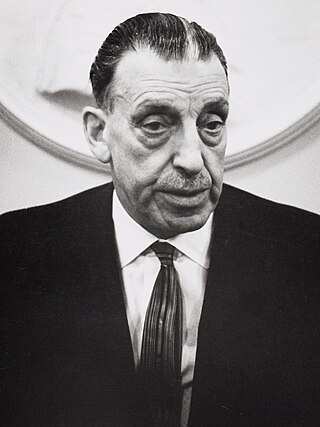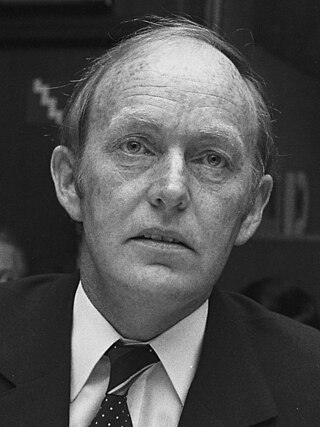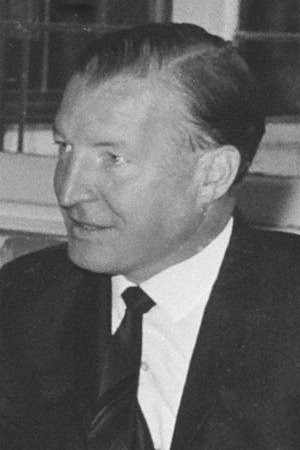
Patrick John Hillery was an Irish Fianna Fáil politician who served as the sixth president of Ireland from December 1976 to December 1990. He also served as vice-president of the European Commission and European Commissioner for Social Affairs from 1973 to 1976, Minister for External Affairs from 1969 to 1973, Minister for Labour from 1966 to 1969, Minister for Industry and Commerce from 1965 to 1969 and Minister for Education from 1959 to 1965. He served as a Teachta Dála (TD) for the Clare constituency from 1951 to 1973.

Charles James Haughey was an Irish Fianna Fáil politician who led four governments as Taoiseach: December 1979 to June 1981, March to December 1982, March 1987 to June 1989, and June 1989 to February 1992. He was also Minister for the Gaeltacht from 1987 to 1992, Leader of the Opposition from 1981 to 1982 and 1982 to 1987, Leader of Fianna Fáil from 1979 to 1992, Minister for Social Welfare and for Health from 1977 to 1979, Minister for Finance from 1966 to 1970, Minister for Agriculture from 1964 to 1966, Minister for Justice from 1961 to 1964 and Parliamentary Secretary to the Minister for Justice from 1959 to 1961. He served as a Teachta Dála (TD) from 1957 to 1992.

Seán Francis Lemass was an Irish Fianna Fáil politician who served as Taoiseach and Leader of Fianna Fáil from 1959 to 1966. He also served as Tánaiste from 1957 to 1959, 1951 to 1954 and 1945 to 1948, Minister for Industry and Commerce from 1957 to 1959, 1951 to 1954, 1945 to 1949 and 1932 to 1939 and Minister for Supplies from 1939 to 1945. He served as a Teachta Dála (TD) from 1924 to 1969.

John Mary Lynch was an Irish Fianna Fáil politician who served as Taoiseach from 1966 to 1973 and 1977 to 1979. He was Leader of Fianna Fáil from 1966 to 1979, Leader of the Opposition from 1973 to 1977, Minister for Finance from 1965 to 1966, Minister for Industry and Commerce from 1959 to 1965, Minister for Education 1957 to 1959, Minister for the Gaeltacht from March 1957 to June 1957, Parliamentary Secretary to the Minister for Lands and Parliamentary Secretary to the Government from 1951 to 1954. He served as a Teachta Dála (TD) from 1948 to 1981.

Desmond Joseph O'Malley was an Irish politician who served as Minister for Industry and Commerce from 1977 to 1981 and 1989 to 1992, Leader of the Progressive Democrats from 1985 to 1993, Minister for Trade, Commerce and Tourism from March 1982 to October 1982, Minister for Justice from 1970 to 1973 and Government Chief Whip and Parliamentary Secretary to the Minister of Defence from 1969 to 1970. He served as a Teachta Dála (TD) for the Limerick East constituency from 1968 to 2002.

George Colley was an Irish Fianna Fáil politician who served as Tánaiste from 1977 to 1981, Minister for Energy from 1980 to 1981, Minister for Tourism and Transport from 1979 to 1980, Minister for the Public Service from 1977 to 1979, Minister for Finance from 1970 to 1973 and from 1977 to 1979, Minister for the Gaeltacht from 1969 to 1973, Minister for Industry and Commerce from 1966 to 1970, Minister for Education from 1965 to 1966 and Parliamentary Secretary to the Minister for Lands from 1964 to 1965. He served as a Teachta Dála (TD) from 1961 to 1983.

Neil Terence Columba Blaney was an Irish politician. He was first elected to Dáil Éireann in 1948 as a Fianna Fáil Teachta Dála (TD) representing Donegal East. A high-profile member of the party, Blaney served as a government minister several times; he was Minister for Posts and Telegraphs (1957), Minister for Local Government (1957–1966) and Minister for Agriculture and Fisheries (1966–1970). In 1970 Blaney's career was radically altered when, alongside Charles Haughey, he was involved in the Arms Crisis and stood accused of clandestinely arranging to provide weapons to the newly-emergent Provisional Irish Republican Army. Although later acquitted of wrongdoing in an Irish court, Blaney's involvement in the crisis saw him stripped of his ministries and eventually forced his expulsion from Fianna Fáil. A dogged political campaigner, Blaney managed to retain his seat in Donegal and remained a TD for another two decades, running under the banner of "Independent Fianna Fáil". In addition to being a TD, Blaney also entered into European politics, becoming a member of the European Parliament in 1979. Blaney was a holder of both offices when he died in 1995. Entering the Dáil as its youngest member, he left it as the oldest member.

Kevin Boland was an Irish Fianna Fáil politician who served as Leader of Aontacht Éireann from 1971 to 1976, Minister for Social Welfare from 1961 to 1966 and 1969 to 1970, Minister for Local Government from 1966 to 1970 and Minister for Defence from 1957 to 1961. He served as a Teachta Dála (TD) from 1957 to 1970.

Brian Patrick Lenihan was an Irish Fianna Fáil politician who served as Tánaiste from 1987 to 1990, Minister for Defence from 1989 to 1990, Minister for Agriculture from March 1982 to December 1982, Minister for Fisheries from 1977 to 1979, Minister for Foreign Affairs from 1987 to 1989, 1979 to 1981 and January 1973 to March 1973, Minister for Transport and Power from 1969 to 1973, Minister for Education from 1968 to 1969, Minister for Justice from 1964 to 1969, Parliamentary Secretary to the Minister for Justice and Parliamentary Secretary to the Minister for Lands from 1961 to 1964. He served as a Teachta Dála (TD) from 1961 to 1973 and from 1977 to 1995. He served as a Senator for the Industrial and Commercial Panel from 1957 to 1961 and 1973 to 1977. He also served as a Member of the European Parliament (MEP) for the Oireachtas from 1973 to 1977.

James Gerard Collins is an Irish former Fianna Fáil politician who served as Minister for Foreign Affairs from March 1982 to December 1982 and 1989 to 1992, Minister for Justice from 1977 to 1981 and 1987 to 1989, Minister for Posts and Telegraphs from 1970 to 1973, Parliamentary Secretary to the Minister for Industry and Commerce and Parliamentary Secretary to the Minister for the Gaeltacht from 1969 to 1970. He was a Member of the European Parliament (MEP) for the Munster constituency from 1994 to 2004. He served as a Teachta Dála (TD) for the Limerick West constituency from 1967 to 1997.

Michael O'Kennedy was an Irish Fianna Fáil politician who served in a range of cabinet positions, including Minister for Agriculture, Fisheries and Food, Minister for Foreign Affairs, Minister for Finance and Irish European Commissioner. He served as a Teachta Dála (TD) for the Tipperary North constituency and was also a member of Seanad Éireann.

Ray MacSharry is an Irish former Fianna Fáil politician who served as Tánaiste from March 1982 to December 1982, European Commissioner for Agriculture and Rural Development from 1989 to 1993, Minister for Finance from March 1982 to December 1982 and 1987 to 1988, Minister for Agriculture from 1979 to 1981, Minister of State at the Department of the Public Service from 1978 to 1979. He served as a Teachta Dála (TD) for the Sligo–Leitrim constituency from 1969 to 1988. He also served as Member of the European Parliament (MEP) for the Connacht–Ulster constituency.

The February 1982 Irish general election to the 23rd Dáil was held on Thursday, 18 February, three weeks after the dissolution of the 22nd Dáil on 27 January by President Patrick Hillery on the request of Taoiseach Garret FitzGerald on the defeat of the government's budget. The general election took place in 41 Dáil constituencies throughout Ireland for 166 seats in Dáil Éireann, the house of representatives of the Oireachtas.

James M. Gibbons was an Irish Fianna Fáil politician who served as Minister for Agriculture from 1970 to 1973 and 1977 to 1979, Minister for Defence from 1969 to 1970 and Parliamentary Secretary to the Minister for Finance from 1965 to 1969. He served as a Teachta Dála (TD) for the Carlow–Kilkenny constituency from 1957 to 1981 and February 1982 to November 1982. He also served as a Member of the European Parliament (MEP) from 1973 to 1977.

Pádraig Faulkner was an Irish Fianna Fáil politician who served as Ceann Comhairle of Dáil Éireann from 1980 to 1981, Minister for Defence 1979 to 1980, Minister for Posts and Telegraphs and Minister for Tourism and Transport from 1977 to 1979, Minister for Education from 1969 to 1973, Minister for the Gaeltacht and Minister for Lands from 1968 to 1969 and Parliamentary Secretary to the Minister for the Gaeltacht from 1965 to 1968. He served as a Teachta Dála (TD) for the Louth constituency from 1957 to 1987.

Patrick Smith was an Irish Fianna Fáil politician, who served as a Teachta Dála from 1923 until 1977; a tenure of 53 years, the longest in the state. He held a number of ministerial positions within the governments of Éamon de Valera and Seán Lemass.
The 21st Dáil was elected at the 1977 general election on 16 June 1977 and met on 5 July 1977. The members of Dáil Éireann, the house of representatives of the Oireachtas (legislature) of Ireland, are known as TDs. It sat with the 14th Seanad as the two Houses of the Oireachtas.

The 1979 Fianna Fáil leadership election began in December 1979, when Jack Lynch resigned as party leader and Taoiseach. Lynch had been party leader for thirteen years and Taoiseach for over nine years. His successor was elected by the members of the Fianna Fáil parliamentary party on 7 December 1979. After one ballot the election was won by Charles Haughey.
Fianna Fáil was founded on 23 March 1926 when a group of Dáil deputies led by Éamon de Valera split from the original Sinn Féin. This happened because de Valera's motion calling for elected members be allowed to take their seats in the Dáil, if and when the controversial Oath of Allegiance was removed, failed to pass at the Sinn Féin Ard Fheis. The new party adopted its name on 2 April of the same year. From the formation of the first Fianna Fáil government on 9 March 1932 until the 2011 general election, the party was in power for 61 of 79 years. Its longest continuous period in office was 15 years and 11 months. Its single longest period out of office, in that time, has been four years and four months. All eight of its party's leaders have served as Taoiseach. It was the largest party in Dáil Éireann at every general election from the 1932 general election until the 2011 general election, when it suffered the worst defeat of a sitting government in the history of the Irish state.

The leader of Fianna Fáil is the most senior politician within the Fianna Fáil political party in Ireland. Since 26 January 2011, the office has been held by Micheál Martin, following the resignation of Brian Cowen as leader of the party four days earlier. Martin is also the longest-serving leader, serving for a total of 13 years as of 2024.



















